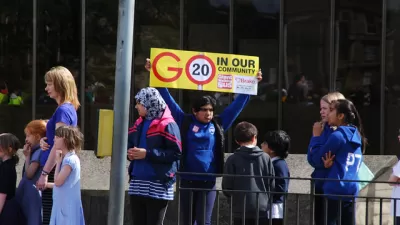A blog post by Eric Britton covers Mayor Madame Anne Hidalgo's plans to adopt a 30 kilometer per hour (approximately 20 miles per hour) maximum speed limit in Paris.

As Angie Schmidt reports, slow-speed zones are gaining traction in cities that want to improve pedestrian safety and enhance livability. Schmidt lists 20 miles per hour zones in New York City, similar adoptions in London with studied benefits, and now Paris for the city in its entirety (minus a few major streets). Schmidt cites Eric Britton's recent blog post as the latest high profile example on this slowing-things-down movement—what Britton calls "slowth."
Britton says that if the city adopts Mayor Madame Anne Hidalgo's plan, the new citywide slow-speed limit will be implemented on all streets except a "small number of major axes into the city and along the two banks of the Seine, where the speed limit will be 50 km/hr, and the city’s hard pressed ring road (périphérique) where the top permissible speed has recently been reduced from 80 to 70 km/hr." Per Britton, in addition to the reduced citywide speed limit, there will be "'meeting zones' (zones de rencontre) spotted around the city in which pedestrians and cyclists have priority but mix with cars which are limited to a top speed of 20 km/hr."
Britton writes that Mayor Hidalgo's idea expands upon "a steady increase in the number of zones reserved for pedestrians only, and more recently a step-by-step movement to “eco-areas” (see http://www.eco-quartiers.fr) where top speeds are already limited to 30 km/hr. By 2013 some 560 kilometers of the city streets were already in such areas, about one third of the total." Britton hopes to see significant results from the reduced speed limit, such as "substantially fewer accidents, significant reduction in serious injuries and deaths…reduced carbon stress on climate, and the long list goes on."
FULL STORY: Paris to limit speeds to 30 km/hr over entire city

Alabama: Trump Terminates Settlements for Black Communities Harmed By Raw Sewage
Trump deemed the landmark civil rights agreement “illegal DEI and environmental justice policy.”

Planetizen Federal Action Tracker
A weekly monitor of how Trump’s orders and actions are impacting planners and planning in America.

How Atlanta Built 7,000 Housing Units in 3 Years
The city’s comprehensive, neighborhood-focused housing strategy focuses on identifying properties and land that can be repurposed for housing and encouraging development in underserved neighborhoods.

In Both Crashes and Crime, Public Transportation is Far Safer than Driving
Contrary to popular assumptions, public transportation has far lower crash and crime rates than automobile travel. For safer communities, improve and encourage transit travel.

Report: Zoning Reforms Should Complement Nashville’s Ambitious Transit Plan
Without reform, restrictive zoning codes will limit the impact of the city’s planned transit expansion and could exclude some of the residents who depend on transit the most.

Judge Orders Release of Frozen IRA, IIJA Funding
The decision is a victory for environmental groups who charged that freezing funds for critical infrastructure and disaster response programs caused “real and irreparable harm” to communities.
Urban Design for Planners 1: Software Tools
This six-course series explores essential urban design concepts using open source software and equips planners with the tools they need to participate fully in the urban design process.
Planning for Universal Design
Learn the tools for implementing Universal Design in planning regulations.
Jessamine County Fiscal Court
Caltrans
Institute for Housing and Urban Development Studies (IHS)
City of Grandview
Harvard GSD Executive Education
Toledo-Lucas County Plan Commissions
Salt Lake City
NYU Wagner Graduate School of Public Service



























